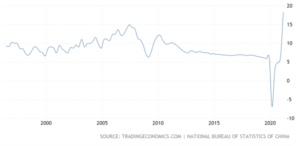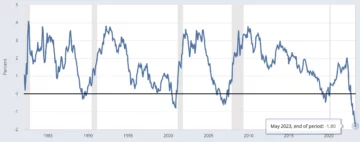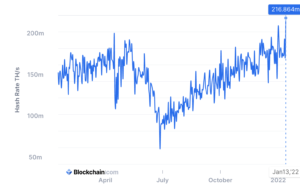More than 70% of all ethereum validators are now complying with the Office of Foreign Assets Control (OFAC) sanctions.
The sanctioned smart contract, an asset obfuscating mixer called Tornado Cash, was put on the list in August with some entities starting to deny transaction to and from the smart contract soon after.
Most prominently, the US based ethereum node infrastructure provider Infura by ConsenSys, began censoring Tornado just days after the sanction.
Since then, this has reached the point where more than 2/3rd of the network won’t process a transaction to or from Tornado.
The reason appears to be Miner Extraction Value (MEV) which has developed a very centralizing effect on ethereum.
As miners can decide the order of transactions, and indeed whether to include one at all, they can give priority to their own transaction to say buy a token at a lower price just before their ‘customer’ – the etherean that actually wanted to buy it – and then sell it to that ‘customer’ in the next transaction order, so making a profit.
Ethereum developers have not yet come up with a way to have a first come, first served order, and so the second best solution chosen is to open source this MEV so that anyone can participate.
A staker therefore that wants to participate in what is effectively cheating and abuse of power, has to relay their block to the MEV which then does the dirty work.
The problem is that there are very few such relays, and plenty of them are in US, so they’re complying.
The most used one is Flashbots, which claims more than 90% of miners used it, probably because it was one of the first and it is open source.
“The mev-boost relay is a trusted mediator between block producers and block builders. It enables all Ethereum proof-of-stake validators to offer their blockspace to not just Flashbots but other builders as well,” it says.

This in practice translates to ethereum actually having about 20 decision making validators, even though it has half a million active validators.
And even then actual decision makers stands at a prominent one Flashbots, and then smaller competitors that have arisen, albeit only regarding transaction ordering and inclusion.
That’s in the ordinary course when there are no problems. If problems arise, those half a million can choose or switch their staking entities, and those staking entities can choose their MEV relay.
So it is not a rigid design, but very dynamic, however in practice you have inertia and much else with Coinbase for example censoring 71%.
Coinbase’s co-founder Brian Armstrong has previously stated that he would shut down the staking service Coinbase provides, rather than censor at validator level. Although he did qualify that with “I think” and suggested other potential options, like legal challenges.
The fact that Coinbase is not fully censoring does show that he is holding to it, and considering Coinbase has an army of lawyers, the legal advice is presumably that OFAC sanctions do not apply at the protocol level.
That makes it very unclear as to why Flashbots or Infura think otherwise, but Coinbase using (presumably) Flashbots can be a way of them actually not censoring while kind of censoring.
This lack of resistance by ethereum protocol level actors is slightly surprising because there has to be neutrality at the protocol level, like gold where of course you should punish the criminal, but gold itself doesn’t judge.
Here, it is a criminal act now in US and for US actors to transact with Tornado Cash. Since the blockchain can be fairly transparent, they should increase blockchain analytical capabilities and so arrest those that use it.
Why should the protocol get involved instead when that path can lead to a very big mess and in extremes it can even partition the network completely, especially when it is not in the interest of any of these validators at all to in any way play with the principle of neutrality.
The blockchain should be a space where even waring countries can still transact, just as with gold. You can have judgment/s above that base protocol, but where the base itself is concerned, it should be treated like gold: a dum, inanimate, unjudgemental tool.
MEV therefore not only amounts to basically theft, but is also a highly centralizing tool that needs to be combated by somehow removing the ability of stakers to order transactions.
That has the problem that doing so removes fees, and so why should stakers stake. Part of the answer is that the ethereum network itself provides them rewards through basically printing eth.
So stakers are less of a problem than spam where you can just clog the network, but that has an easy solution in putting a fixed network fee at the protocol level.
The biggest problem instead is what exactly is ‘first seen’ considering that nodes may see different things. You can solve this by having a proof of work solution, or stake, by having tiny blocks within a block, a solution that can potentially withstand any attempts on humans – while still desiring the network to run – even if somehow we have descended into a complete dictatorship (god forbid).
The problem there would be that this network would obviously be very very slow, and the resource requirements for blocks for each transaction would be very very high. So there probably is a tech solution ad extremes, but a far easier solution is just don’t use Flashbots; or as a validator don’t care about Flashbots at all and just go to a pool that doesn’t use them or stake without using it.
It is still afterall 70% of the network, not 100%. Transactions are still moving to and from Tornado. This is also not sufficiently controversial for most to care, so it is not quite that the network is censoring but more that a few people are playing on inertia.
In addition this ‘censorship’ currently amounts more to just waiting a few minutes rather than a few seconds for your transaction to confirm.
In addition if you value privacy that highly that you want to use a sanctioned contract, you can just try paying a sufficiently enticing fee for validators to argue more the principle of neutrality than inertia.
This percentage can increase however, but at even 80% you’re just waiting a bit longer. So from a sanctions application perspective, it is not effective because the funds still move.
Presumably there will always be a 20% that will keep them moving, but even if we go to 100%, someone can just fork the contract and launch a new one, or 1,000 of them, and we’re back to no technical solution, though in this case on the other shoe.
For that reason, unless we do descend into a dictatorship, we do not expect any validator to be held liable for simply blindly processing transactions, because why should eth be any different than gold.
You can say just use gold, but that would then be a political value decision that moves too far from the matter at hand and of course would not be in the interest of these eth holding validators.
In addition running a ‘criminal’ node would not be that hard, especially globally and for a good fee, so it is a bit pointless but ethereum is going through a test of sorts in regards to its censorship resistance and whether it can withstand that test may matter in years to come as power is abused.
Now it may well be something few care about, but if the method works it may apply more and more. Making it a careful balance of showing yes, we won’t defy you since this is criminal law, but the tech is actually neutral at a tech level.
As an aside, the Ethereum Foundation used to have a canary which they took down, presumably due to Griffith. Maybe it’s time they put up another one to take it down eventually.
- SEO Powered Content & PR Distribution. Get Amplified Today.
- Platoblockchain. Web3 Metaverse Intelligence. Knowledge Amplified. Access Here.
- Source: https://www.trustnodes.com/2022/12/14/70-of-the-ethereum-network-now-censoring
- 000
- 1
- 2022
- a
- ability
- About
- above
- abuse
- Act
- active
- actually
- Ad
- addition
- advice
- After
- All
- Although
- always
- amounts
- Analytical
- and
- Another
- answer
- anyone
- Application
- Apply
- argue
- Armstrong
- Army
- arrest
- asset
- Assets
- Attempts
- AUGUST
- back
- Balance
- base
- based
- Basically
- because
- before
- began
- BEST
- between
- Big
- Biggest
- Bit
- blindly
- Block
- blockchain
- Blocks
- Brian
- brian armstrong
- builders
- buy
- called
- capabilities
- care
- careful
- case
- Cash
- Censorship
- Censorship Resistance
- challenges
- cheating
- Choose
- chosen
- claims
- Co-founder
- coinbase
- come
- competitors
- complete
- completely
- concerned
- Confirm
- ConsenSys
- considering
- contract
- control
- controversial
- countries
- course
- Criminal
- Currently
- decision
- Decision Making
- descend
- Design
- developed
- developers
- DID
- different
- Doesn’t
- doing
- Dont
- down
- dynamic
- each
- easier
- effect
- Effective
- effectively
- enables
- entities
- especially
- ETH
- ethereum
- ethereum foundation
- ethereum network
- Even
- eventually
- exactly
- example
- expect
- extremes
- fairly
- fee
- Fees
- few
- First
- fixed
- flashbots
- foreign
- fork
- Foundation
- from
- fully
- funds
- get
- Give
- Globally
- Go
- God
- going
- Gold
- good
- Half
- Hard
- having
- Held
- High
- highly
- holding
- However
- HTTPS
- Humans
- in
- include
- inclusion
- Increase
- inertia
- Infrastructure
- infura
- instead
- interest
- involved
- IT
- itself
- judge
- Keep
- Kind
- Lack
- launch
- Law
- Lawyers
- lead
- Legal
- Level
- List
- longer
- Makers
- MAKES
- Making
- Matter
- max-width
- method
- MEV
- mev-boost
- MEV-boost relay
- million
- miner
- Miners
- minutes
- mixer
- more
- most
- move
- moves
- moving
- needs
- network
- Neutral
- New
- next
- node
- nodes
- OFAC
- offer
- Office
- ONE
- open
- open source
- Options
- order
- ordinary
- Other
- otherwise
- own
- part
- participate
- path
- paying
- People
- percentage
- perspective
- plato
- Plato Data Intelligence
- PlatoData
- Play
- playing
- Plenty
- Point
- political
- pool
- potential
- potentially
- power
- practice
- previously
- price
- principle
- priority
- privacy
- probably
- Problem
- problems
- process
- processing
- Producers
- Profit
- prominent
- proof
- Proof-of-Stake
- protocol
- provider
- provides
- put
- Putting
- qualify
- reached
- reason
- regarding
- regards
- removing
- Requirements
- Resistance
- resource
- Rewards
- Run
- running
- Sanction
- Sanctioned
- Sanctions
- Second
- seconds
- sell
- service
- should
- show
- Shut down
- simply
- since
- slow
- smaller
- smart
- smart contract
- So
- solution
- SOLVE
- some
- Someone
- something
- Source
- Space
- spam
- stake
- stakers
- Staking
- stands
- Starting
- Still
- such
- surprising
- Switch
- Take
- tech
- Technical
- test
- The
- The Ethereum Foundation
- theft
- their
- therefore
- things
- Through
- time
- to
- token
- too
- tool
- tornado
- Tornado Cash
- transact
- transaction
- Transactions
- transparent
- trusted
- Trustnodes
- us
- use
- Validator
- validators
- value
- Waiting
- wanted
- What
- What is
- whether
- which
- while
- will
- within
- without
- Work
- works
- would
- years
- Your
- zephyrnet












